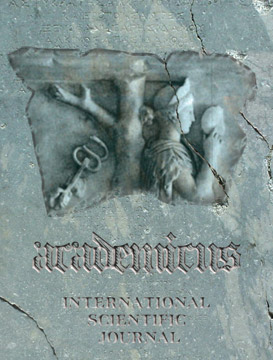Title:
Author(s):
Abstract:
This short essay wants to look at beat literature as a medium that has re-introduced in popular feelings the possibility to change the world, transforming its social rules by using new technologies as instruments for emancipation. Stating this, the essay links the beat movement to hipster’s hopes of the beginning of the XX century, with the need to reflect on the meaning of two WW as barriers to people’s emancipation. From the non-academic side of the perspective, the essay indicates some special sources, trying to demonstrate how beat literature has shaped new meanings to words like “occult”, “magic”, linking them with other words like “awareness” and “emancipation”. Doing this, a tribute is given to the historical role played by the magazine “International Times” as living witness of the years when beat literature was germinating into the generational protest. The conclusions are oriented towards the meaning in the present for a beat attitude to (social) life, with the new awareness of the way indicated by Allen Ginzberg about the unuseful dimension of drugs as instruments to get the vision, and the need to substitute them with natural tools to be able to extract them from unconscious through yoga and meditation systems. This may help to create a new kind of people, involved in a cosmopolitan interpretation of life, able to interconnect by the new information and communication technologies, ready to create a new social intellect. Of course, we do not pretend to present this work of network as a strong link, rather, it seems to be a weak tie. Nevertheless, this weak tie in sociology is a concept used to indicate a relationship that is not as strong as quotidian family or professional relationships. The strength of weak ties theory affirms that weak ties provide access to new audiences where you could find opportunities or contrary opinions that would make ideas stronger, looking at how a person’s network can contribute to their success. Ideas are like germs and they don’t diffuse through populations of people at random, instead, they make their way through networks – that is the kind of relationships we may have with people, creating connections with others. The changes in communication system (Internet, on the immaterial side, the mobility system on the physical side) are creating new opportunities to create network both on the immaterial and on the physical side. Conference driven by intellectual affinities and wishes to know better each others culture seems to generate the conditions of a new kind of people, creating cosmopolitan attitude as something that can be shared by an increasing number of people.
Keywords:
Beat; revolution; psychedelic; psychonalisis; deep psychology; archetypes; open source; emancipation; awareness; koiné
Full Text PDF:
References:
View complete reference list, click
here
Digital Object Identifier DOI:
The article's content ©Academicus™ The Rising of the Cosmopolitan Personalities
by
Dr. (PhD) Davide C. Crimi
is licensed under a Creative Commons
Attribution-NonCommercial 4.0 International License.
Presented:
February 2014
Included for Publishing:
June 2014
Published:
July 2014,
Volume 5,
Issue 10
Academicus International Scientific Journal is an Open Access Journal. This means that all content is freely available without charge to the user or his/her institution. Users are allowed to read, download, print, search, or link to the full texts of the articles in this journal without asking prior permission from the publisher or the author. This is in accordance with the BOAI definition of open access. Users are obliged to cite the source (Academicus International Scientific Journal) and the author, according to the international citation standards.
To learn more about the OA Policy followed by Academicus ISJ, read Journal Regulations
Academicus
International Scientific Journal
pISSN 2079-3715
eISSN 2309-1088
Address:
Sheshi i Flamurit, Rruga Muze
Al-9401 Vlorë, Albania
Tel: +355 68 60 60 555
info@academicus.edu.al
https://academicus.edu.al



 Scholar
Scholar
 Crossref
Crossref
